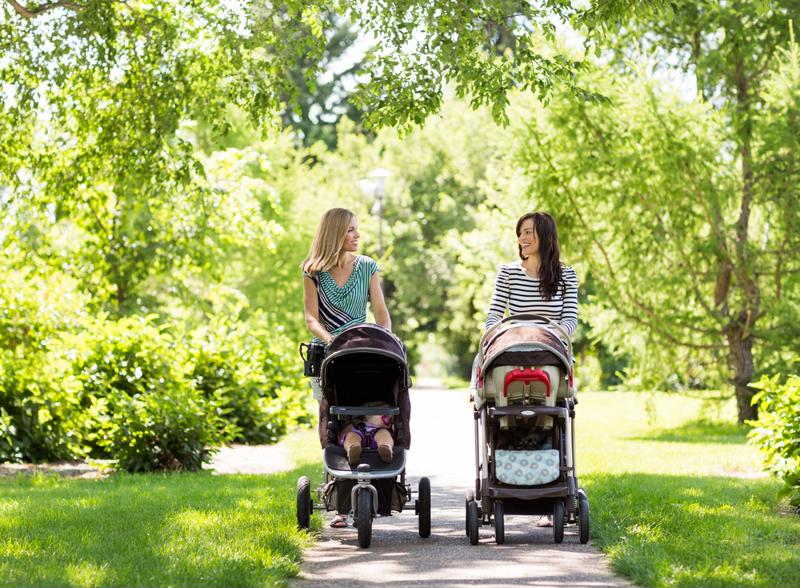The long, sunny days of summer are fun to spend outside with your friends and family. But for your baby, fun in the sun can become dangerous. Summer safety for your baby begins with ample sun and heat protection.
Babies’ bodies haven’t quite mastered the art of temperature regulation, so it’s easy for little ones to overheat. Plus, their baby-soft skin hasn’t endured sun exposure yet, making them a prime candidate for a bad sunburn. To prevent pain and potential illness for your baby, it’s important to understand how to stay safe in the sun.
Play it safe in the shade
When babies are born, their skin has very little melanin, which is the natural substance your body produces that determines your skin color and offers some sun protection, the Skin Cancer Foundation explained. Since babies are still developing melanin, their skin isn’t yet ready to be sunkissed. As such, parents should do their best to keep the rays off their little one’s arms, legs and face.
If your child loves to play outside, be sure to provide some shade. Whether it’s the canopy of the stroller on your afternoon walk or an oversize umbrella to bring to the beach, providing shade is one of the best ways you can protect your baby from the sun.
 Stroller canopies provide sun protection while on your walks.
Stroller canopies provide sun protection while on your walks.The outfits you choose for your infant can also help. It might seem counterintuitive to pick out long pants and long-sleeved shirts for your baby on a bright summer day, but these are best to offer greater protection against the sun. Just be sure to choose lightweight, breathable fabrics.
In addition, wide-brimmed hats and sunglasses protect them from the sun. Your eyes also have melanin that helps to protect against painful sunburn, but your baby is lacking this benefit. Seek out shades that protect your baby’s eyes from UV rays. Baby sunglasses often have a soft strap that keeps them propped over their eyes.
When should babies use sunscreen?
Since your baby’s skin is so sensitive to the sun, it may seem like applying sunscreen is an obvious method of protection. In reality, though, many experts recommend against this, according to the U.S. Food and Drug Administration.
“Babies’ skin is less mature compared to adults, and infants have a higher surface-area to body-weight ratio compared to older children and adults,” explained Dr. Hari Cheryl Sachs, a pediatrician at the FDA. “Both these factors mean that an infant’s exposure to the chemicals in sunscreens may be much greater, increasing the risk of side effects from the sunscreen.”
Once your baby reaches the six-month mark, you can begin seeking out appropriate sunscreens, but it’s best to do this with the advice of your pediatrician.
Before buying a bottle of sunscreen, check the ingredients label. The Skin Cancer Foundation recommends opting for formulas that use zinc oxide or titanium dioxide because they generally are less likely to cause a skin reaction. Just to be sure, though, test a small amount on your baby’s wrist to see if it’s a good match. If you see a rash or other type or reaction form, find a different product.
When applying sunscreen to your baby, be sure to get all surfaces of exposed skin, including ears, neck and hands. If you’re using spray-on sunscreen, spray it into the palm of your hand before rubbing it onto her face. Finally, sunscreen should not replace basic sun protection, like long sleeves, hats and ample shade.
How to avoid heat stress
Sunburn isn’t the only danger to infants during the summer. Babies can quickly overheat because their bodies don’t regulate temperature or produce sweat as much as adults do.
Keep your baby hydrated, and monitor her skin and behavior for signs of heat cramps, exhaustion or stroke. These conditions can become very serious but aren’t as easy to identify in babies as they are in adults.
Get out of the sun and heat if your baby:
- Has a fever below 104 degrees Fahrenheit, Seattle Children’s Hospital explained.
- Has normal dizziness, muscle cramps or achiness after sun exposure.
Go directly to the emergency room if your baby:
- Is dehydrated – look for very little or dark yellow urine or dry mouth.
- Has a fever or dizziness, even after drinking fluids for more than 2 hours.
- Is vomiting that prevents him from drinking fluids.
- Is younger than 12 weeks and has a fever or is not acting normally after heat exposure.
Call 911 if your baby:
- Shows signs of shock, including gray, cool skin.
- Has a fever of 105 degrees Fahrenheit or more (rectal temperature is most accurate for this).
- Can’t wake up.
- Acts confused.
- Has a seizure.
Having fun in the sun is one of the best aspects of summer, but this must be done safely. By following these summer safety tips to protect your little one from sunburn and heatstroke, you can safely enjoy the warm weather.
